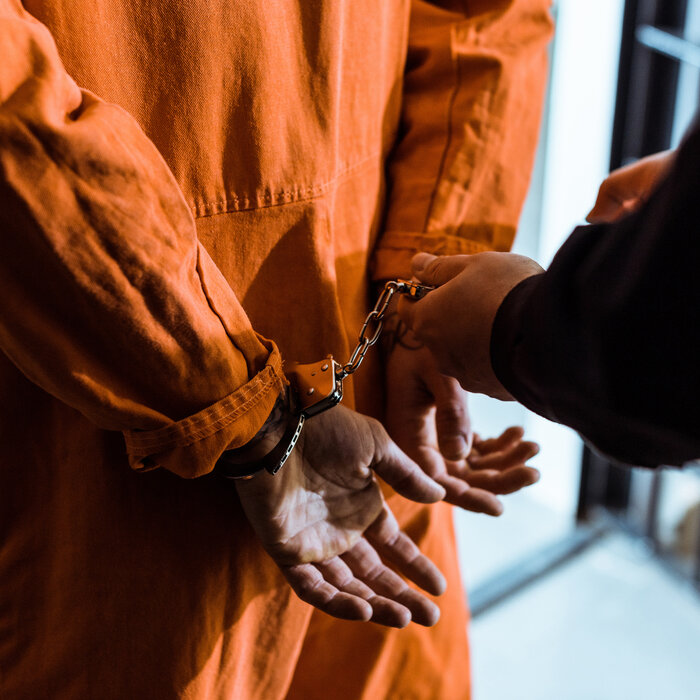For the last 29 days, six hours and 28 seconds, these tiny bathrooms we live in, which we call cells, have been the entire world for the men in USP Coleman 1. It’s where we exercise (I’ve gotten up to 1,000 pushups), walk off our stress (six steps to the door, six steps back to the wall, around and around) and bathe (hanging up our sheets like a curtain, to eke out a modicum of privacy). To pass the time, we read and try to converse with our friends by shouting under our doors, straining to be heard.
Unable to call, email or even send letters (we couldn’t even buy stamps), we have missed kids’ birthdays, the death of parents, major holidays and court deadlines. In other words, we have missed life as we are being held incommunicado, isolated from the outside world. (With the commissary—the prison store—declared off limits, we can’t buy batteries, needed to power our radios.)
The closure of the commissary also means we’re hungry. We’re prohibited from purchasing food, and the bag meals they deliver to our cells simply aren’t enough.
Why are we all so isolated? “One of them” was assaulted by “one of us.” In this case, an officer pushed a prisoner’s head into the wall as he pat searched him, while putting his hands up his butt crack and verbally abusing him. When the officer let him off of the wall, the guy turned around and punched him.
And that means “all of us” had to be punished. I get it; I don’t condone solving grievances with violence, and there must be some type of penalty for wrongdoing. But that is not the whole story. These incidents don’t happen in a vacuum. A prisoner doesn’t typically wake up one day and think, “I’m going to assault an officer.” Such an act is usually triggered by an aggressive or discriminatory action by the staff. Likewise, prisoners are assaulted by correctional officers with some frequency; yet when that occurs, there are no consequences. It’s clear which lives matter within the federal Bureau of Prisons, and which don’t.
The anatomy of abuse
For instance, a guy I know from DC had a verbal altercation through his cell door with an officer, and as a result, he was gassed and forced to cuff up. Now, at no point, especially after he was cuffed, did he pose a real threat to staff. But that didn’t stop the COs from dragging him down the steps by his cuffs and assaulting him after he was taken to a secure place off camera. (That’s a common practice not helped by the bill that just passed Congress, requiring the BOP to upgrade outdated and broken security camera systems.) Shouldn’t the officer face consequences for this? Was he sanctioned in any way? No! If this incident were to get any external exposure, the response from the administration would be that he he is just one rotten apple (or that he is a “changed man” today, like BOP Director Colette Peters said of the prisoner abuser Thomas Ray Hinkle). But when it comes to prisoners’ misconduct, everyone is punished (not just the person who committed the act)…severely!
When an officer is assaulted, it’s usually because he trashed a prisoner’s personal property. It’s antagonizing and dehumanizing. I’ve seen officers throw away pictures of guys’ deceased family members, pour oil from the fish packets they bought at the prison store on their books, step on their prayer rugs, and scatter their legal papers. I’ve also seen officers pick arguments with guys just to send them to the hole, and this is why it is so hard to live in a USP (high-security penitentiary) without getting written up. When we appear before a parole board or judge, those shots (disciplinary actions) makes it look we are bad people, but the environment should be considered as well.
Shouldn’t we all be held accountable?
This will never stop until there are consequences for officers’ misconduct. Early last year, President Biden issued an executive order saying, “It is the policy of my administration to ensure that conditions of confinement are safe and humane, and that those who are incarcerated are not subjected to unnecessary or excessive uses of force.” Later that month, Attorney General Merrick Garland, updated the Department of Justice use-of-force policy for the first time in 18 years, telling federal agents they have a “duty to intervene if they see other law enforcement officials using excessive force.” What has happened since then? If any concrete changes have been made, we haven’t seen any evidence.
Actually, in a lot of ways, the prison administration seems to condone officers’ abusive behavior. And it’s simply not realistic to expect prisoners to be beaten, violated, cursed at, etc. and not respond. Until prison staff are held to account, prisoners will continue to be beaten and abused with impunity, and those that won’t just take the abuse will fight back in whatever way they can. Then we’ll all be punished, and the cycle will continue…




